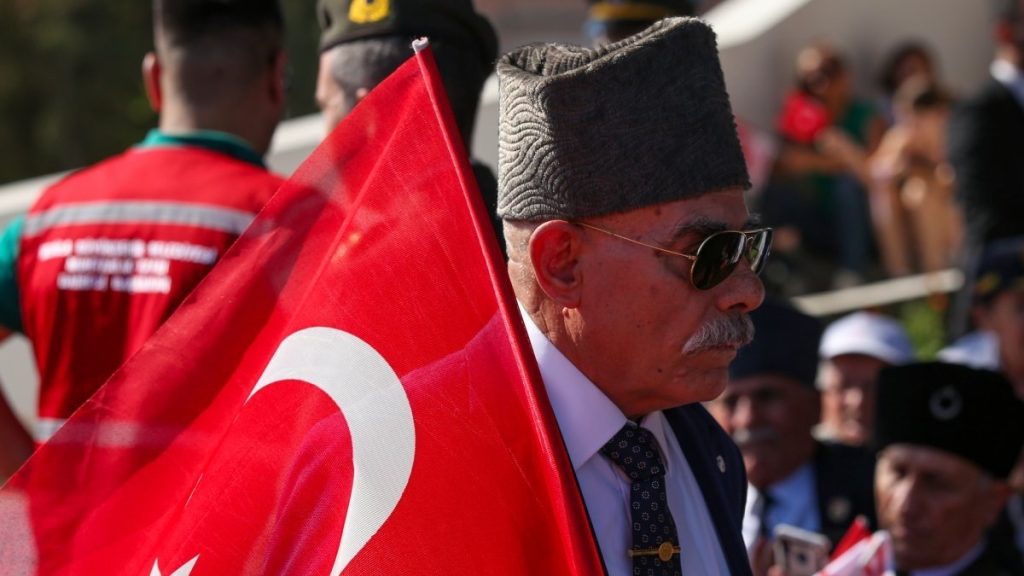Political structures functioning as the continuation of the Ethniki Organosis Kyprion Agoniston (EOKA) terrorist group, as well as other far-right parties in the Greek Cypriot administration and Greece, are fueling the black propaganda against Turks and Türkiye on the divided island, according to a Turkish professor.
“The EOKA mentality is still being preserved both in the political arena and in daily life,” professor Ismail Şahin, the head of the International Crisis Research Center, told Anadolu Agency (AA) on the 70th anniversary of the terrorist group’s foundation.
Although EOKA is not an active organization today, its ideologies are still alive in the political arena, and this political entity triggers hostility toward Turks on the Greek side, Şahin argued.
“We can say that EOKA supporters are trying to convey their ideas and ideologies to civil society, mainly through the party known as the National People’s Front in Greek Cyprus, known as ELAM, and the socialist AKEL. The programs, discourses and propaganda of parties such as ELAM in particular are in line with EOKA. This idea continues to be kept alive on the political ground,” he said.
Şahin’s remarks follow celebrations of EOKA’s establishment, as well as attempted attacks on Turks earlier this week, where a fanatic Greek Cypriot group threw stones and insulted Turkish Cypriots at the border area dividing the capital Lefkoşa (Nicosia).
According to sources from the Turkish Republic of Northern Cyprus (TRNC), a group of 15 black-dressed fanatic Greek Cypriots, who were attending the anniversary celebration of the establishment of their terrorist group, threw stones at civilians in the Yiğitler Burcu Park in Lefkoşa, on the TRNC border, from the territory of the Greek Cypriot administration. Insulting civilians and chanting slogans in support of EOKA, the group then fled the area.
Founded by Georgios Grivas in 1954, EOKA staged its first terror attack a year later. However, its primary objective was to fight against the British occupiers of the island in the East Mediterranean.
The terror group began committing more terror attacks and massacres against Turkish Cypriots in 1958, in line with its goals of clearing the island of Turks and uniting it with Greece.
EOKA has been notorious since then for its crimes against Turks and is listed as a terrorist organization, but celebrations continue to be held in schools every year for its foundation.
“These celebrations, which are portrayed as a ‘show of force’ in Greek Cyprus, are essentially an indication of efforts to keep the hostility toward Turks alive in Greek Cyprus,” Şahin argued.
He said the fact that Cyprus could not be connected to Greece has fueled the hateful perspective even more.
According to Şahin, the Turkish Cypriots’ resistance to Greece’s potential annexation of the island caused a “serious trauma” among the Greek, which combined with the hostility toward Turks that occasionally emerged during the Ottoman period and EOKA’s identity during Enosis, the campaign to unite the island with Greece, which was promoted by the Cypriot Orthodox Church, spread a wave of hatred toward the Turks, Turkish Cypriots and Türkiye on the island.
“The recent incidents were covered as a new development in the Turkish public, but in reality, these sorts of celebrations are held every year and embraced by the Greeks on the island,” Şahin said.
“There is great sympathy on the Greek side for this structure that we see as a terrorist organization,” he said, arguing that they portray EOKA as “a resistance movement, the defending force of the Hellenistic Cypriot identity.”
“This can be seen in schools, the education system and society in general,” he said. “Although EOKA is presented as a distant organization or structure belonging to the past, today, roughly 75% of the Greek community unfortunately shares EOKA’s ideas, thoughts and beliefs.”
Şahin cited the increase in votes for the ELAM Party over the past decade, jumping from 3% to 6.5% and then to 11% today.
“They are not just a small group that chants slogans on anniversaries and carries out anti-Turkish campaigns but a movement that has gained momentum and grown into a large political community,” Şahin warned.


